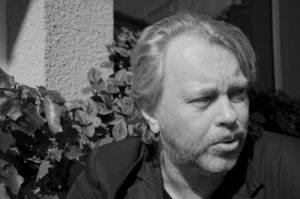Herkus Kunčius

Herkus Kunčius (born 1965) is one of the most prolific Lithuanian writers, publishing a book or a play every year since his debut in 1998. His work, novels, essays and plays, is marked by postmodernist features and a scornful irony towards consumer society and its fake and superficial values. He often gives frank descriptions of bodies and bodily functions, and he is never afraid of blasphemy or indecency. His writing has been described as a ‘carnival’, and it clearly contains shock value, cruelty and nihilism. He is one of the few Lithuanian playwrights whose work is frequently put on in major theatres, and he has won numerous awards for them. His fiction is less acclaimed, but it always attracts the attention of serious critics.
Geležinė Stalino pirštinė (Stalin’s Iron Glove). Vilnius: Lithuanian Writers’ Union Publishing House, 2019. – 408 p.
The title of the novel is the nickname of its title character, Nikolai Ivanovich Ezhov. He peaqued the author’s interest due to the fact that he had a Lithuanian mother and was probably born in Lithuania. Late in his career he admitted knowing the Lithuanian language and using that knowledge in his work: interrogations and tortures. Ezhov was called “Stalin’s bloodiest executioner”, one of the key figures in organizing the mass repressions in the countries occupied by the Soviets, the person mostly responsible for what is known as Stalin’s Great Purge. However, like many in the Soviet machine, he was eventually arrested and executed himself.
The novel seems like a culmination in an almost lifelong interest and study of “a Soviet man”. Kunčius has more than once expressed his fascination with the fact that for the Soviets, “creating a new man” was not simply a slogan, they really did manage to create a new psyche, a new culture – new human beings. This fictionalized biography chooses a psycopathic, perverted subject and employs him to analyze the more generalized idea of “the Soviet man”.
Selected translations
Polish: Obrazkie litewskie. Translated by Kamil Pecela. Warsztaty kultury, 2019
Litwin w Wilnie. Translated by Michał Piątkowski. Wroclaw: Kolegium Europy Wschodniej, 2014
Bulgarian: Минало многократно време. Translated by Antonia Penčeva. Sofia: Fakel Express, 2015
Христоматия на пияницата. Translated by Antonia Penčeva. Sofia: Fakel Express, 2013
German: Ornament. Translated by Mala Vikaite. Leipzig: Edition Erata, 2005
Contact for inquiries: kotryna.pranckunaite@lithuanianculture.lt